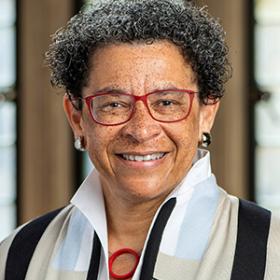
Jacqueline Goldsby ’98 PhD




Jacqueline Goldsby’s research and teaching focus on African American and American literature. Goldsby joined Yale’s faculty in 2011 and served two terms as chair of Yale’s African American Studies Department, 2014–2022.
Goldsby is interested in the ways that authors and texts articulate un-archived, “secret,” and so, unspeakable developments that shaped American life during the long century of Jim Crow segregation’s reign, from 1865 to 1965. She explores these tensions through interdisciplinary approaches to formal close reading, together with the material and cultural histories of Black-authored books—their composition, publication, circulation, and reception.
For instance, her first book, A Spectacular Secret: Lynching in American Life and Literature (2006), examines how literary depictions of anti-Black mob murders at the turn of the 20th century figure the violence as a trope of American modernity. Her next monograph, Writing from the Lower Frequencies: African American Literature at Mid-Century, focuses on the regenerative aesthetic life that Jim Crow segregation gave rise to during the mid-20th century. To research Writing from the Lower Frequencies, Goldsby had to recover the archives she wanted to write about. Two of these initiatives have received major funding from the Andrew W. Mellon Foundation.
The first, “Mapping the Stacks” (2005–2010), recovered manuscripts, sound recordings, photographs, and moving images that document Black Chicago’s literary, cultural, and visual histories during the 1930s to the 1970s. “Mapping the Stacks” played a key role shaping the recent rise of Black Chicago Renaissance studies. The second initiative stems from my research in African American Book History. Since 2017, Goldsby co-directs The Black Bibliography Project with Meredith McGill of Rutgers University to revive descriptive bibliography—the systematic description of print materials as physical objects—for African American and Black Diaspora literary studies. They are creating a digital database whose capacities can reveal the dynamic social formations and aesthetic practices that are specific to Black print culture in the US and beyond.